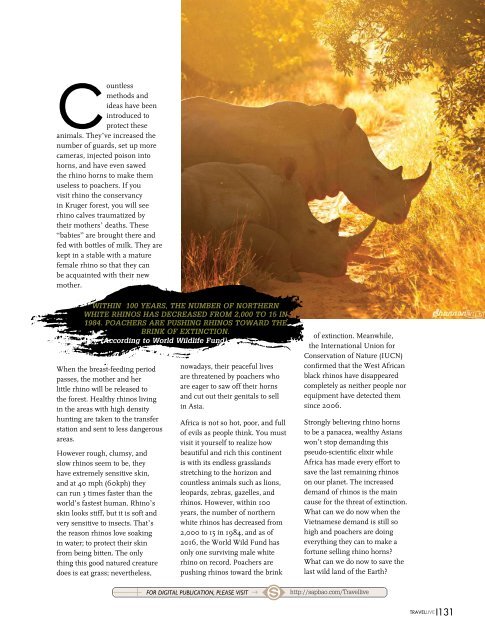TRAVELLIVE 3-2016
Getting up as the first rays of sun enter my room, I can feel in the air that the days of bitter cold and damp have passed and that days of warmth and sunshine are upon us. Good weather is a lucky sign for my upcoming journeys with friends. In this century of technology and high-speed connections, you can travel around the world with the click of a mouse. All the data you could ever want to form an itinerary, from the cuisine to the cultural development of the land, are on your screen immediately upon typing a few characters into the search box. But how long will this stay with you? The things you have just seen, the dreamlands of your fantasies, all fade away someday. Few things in life are more inevitable.
Getting up as the first rays of sun enter my room, I can feel in the air that the days of bitter cold and damp have passed and that days of warmth and sunshine are upon us. Good weather is a lucky sign for my upcoming journeys with friends.
In this century of technology and high-speed connections, you can travel around the world with the click of a mouse. All the data you could ever want to form an itinerary, from the cuisine to the cultural development of the land, are on your screen immediately upon typing a few characters into the search box. But how long will this stay with you? The things you have just seen, the dreamlands of your fantasies, all fade away someday. Few things in life are more inevitable.
Create successful ePaper yourself
Turn your PDF publications into a flip-book with our unique Google optimized e-Paper software.
Countless<br />
methods and<br />
ideas have been<br />
introduced to<br />
protect these<br />
animals. They’ve increased the<br />
number of guards, set up more<br />
cameras, injected poison into<br />
horns, and have even sawed<br />
the rhino horns to make them<br />
useless to poachers. If you<br />
visit rhino the conservancy<br />
in Kruger forest, you will see<br />
rhino calves traumatized by<br />
their mothers’ deaths. These<br />
“babies” are brought there and<br />
fed with bottles of milk. They are<br />
kept in a stable with a mature<br />
female rhino so that they can<br />
be acquainted with their new<br />
mother.<br />
When the breast-feeding period<br />
passes, the mother and her<br />
little rhino will be released to<br />
the forest. Healthy rhinos living<br />
in the areas with high density<br />
hunting are taken to the transfer<br />
station and sent to less dangerous<br />
areas.<br />
However rough, clumsy, and<br />
slow rhinos seem to be, they<br />
have extremely sensitive skin,<br />
and at 40 mph (60kph) they<br />
can run 3 times faster than the<br />
world’s fastest human. Rhino’s<br />
skin looks stiff, but it is soft and<br />
very sensitive to insects. That’s<br />
the reason rhinos love soaking<br />
in water; to protect their skin<br />
from being bitten. The only<br />
thing this good natured creature<br />
does is eat grass; nevertheless,<br />
nowadays, their peaceful lives<br />
are threatened by poachers who<br />
are eager to saw off their horns<br />
and cut out their genitals to sell<br />
in Asia.<br />
Africa is not so hot, poor, and full<br />
of evils as people think. You must<br />
visit it yourself to realize how<br />
beautiful and rich this continent<br />
is with its endless grasslands<br />
stretching to the horizon and<br />
countless animals such as lions,<br />
leopards, zebras, gazelles, and<br />
rhinos. However, within 100<br />
years, the number of northern<br />
white rhinos has decreased from<br />
2,000 to 15 in 1984, and as of<br />
<strong>2016</strong>, the World Wild Fund has<br />
only one surviving male white<br />
rhino on record. Poachers are<br />
pushing rhinos toward the brink<br />
of extinction. Meanwhile,<br />
the International Union for<br />
Conservation of Nature (IUCN)<br />
confirmed that the West African<br />
black rhinos have disappeared<br />
completely as neither people nor<br />
equipment have detected them<br />
since 2006.<br />
Strongly believing rhino horns<br />
to be a panacea, wealthy Asians<br />
won’t stop demanding this<br />
pseudo-scientific elixir while<br />
Africa has made every effort to<br />
save the last remaining rhinos<br />
on our planet. The increased<br />
demand of rhinos is the main<br />
cause for the threat of extinction.<br />
What can we do now when the<br />
Vietnamese demand is still so<br />
high and poachers are doing<br />
everything they can to make a<br />
fortune selling rhino horns?<br />
What can we do now to save the<br />
last wild land of the Earth?<br />
<strong>TRAVELLIVE</strong> 131
















